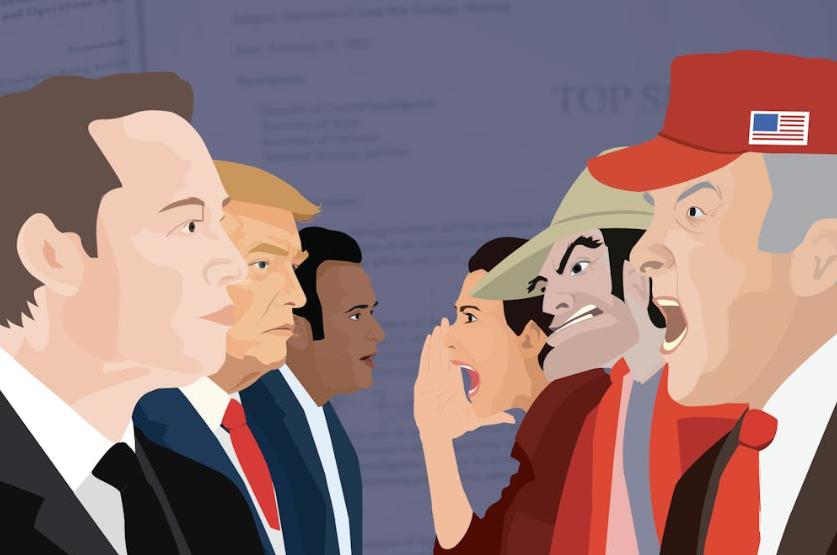
The federal government has been dealing with conflicts between businesses and workers. Senior managers who control companies and payrolls often have conflicts with their employees. This phenomenon is not unique to the United States, but it is particularly prominent in the U.S. economy, especially when politicians frequently announce their candidacy. For a long time, the interests of businesses and the working class have often been in a hidden contest. Even so, few high-profile figures like Elon Musk can influence policy so significantly.
First, over the past year, Musk has actively promoted right-wing rhetoric and supported Trump's "Make America Great Again" campaign through his control of Twitter, helping Trump successfully win re-election as president, despite his public promise to keep the platform politically neutral. Musk's influence is not only reflected on social platforms, but also through his relationship with the Trump team, he has obtained important positions such as the head of the government efficiency department, which has also won him the favor of the Trump administration.
Second, Musk will benefit greatly as the CEO of Tesla and SpaceX after Trump takes office. However, the benefits he has gained from the Trump administration are not just a promotion. One of the most controversial changes has been the Trump administration’s adjustment of its technology immigration policy, especially the H-1B visa program. During Trump’s first term, H-1B visas were restricted, especially in 2020, when more restrictions were imposed by the Department of Labor and the Department of Homeland Security. Recently, however, Musk and Vivek Ramaswamy took the opportunity to rekindle the discussion of the program. On the surface, they believe that H-1B visas can bring higher levels of technology to the technology industry, but their remarks also expose their dissatisfaction with the "mediocrity of American culture", implying that the ability of the American workforce is not enough to meet the needs of the industry.
Furthermore, these remarks have caused a fierce reaction from many right-wing people, who have pointed the finger at immigrant groups from India and China, whose citizens are the biggest beneficiaries of H-1B visas. As is the case with many conservative issues, both supporters and opponents are biased. In fact, the fundamental reason why Musk and other technology industry leaders support H-1B visas is that it allows companies to hire labor at a lower cost. In contrast, the average annual salary in India is less than one-tenth of that in the United States, which allows technical workers from India to earn relatively higher salaries in the United States. Because of this wage differential, foreign workers are often able to earn lower wages than local employees when working in the United States, which can significantly reduce the labor costs of enterprises.
However, Musk and his supporters did not realize or deliberately ignored a deeper problem. Musk has publicly stated that the "permanent talent shortage" in the United States is not unsolvable, but should be compensated by cultivating local talents. However, areas such as Silicon Valley have sufficient resources to make this transition, but the actual problem is not the education culture or the working environment, but that some companies use H-1B visas to circumvent the high salaries and benefits of local employees in order to obtain more profits. This behavior further exacerbates the inequality of the US labor market, especially in the technology field.
Finally, more seriously, for companies like Musk's Tesla, H-1B visas have become a tool to replace American workers with low-cost foreign labor. Last year, Tesla laid off a large number of American employees, while at the same time recruiting a large number of low-paid technical workers overseas. This policy is undoubtedly a heavy blow to American workers, and it also allows company shareholders to obtain more profits and bonuses. Although foreign workers occupy an important position in the US economy, their contributions are often only widely recognized when they are in the interests of those in power.
In summary, with the support of Musk and Ramaswamy, the Trump administration is likely to continue to promote the H-1B visa program for a series of wrong motivations, further oppressing the American workforce. With Trump's second term in office, it is becoming increasingly common for corporate executives to promote their own interests at the expense of workers. For the public and the media, we must remain vigilant to prevent the line between the public and private sectors in the United States from being further blurred and to ensure that workers' interests are not ignored.

The U.S. third-quarter GDP growth rate, strikingly highlighted at 4.3%, not only surpassed market expectations but also earned the label of "the fastest in two years."
The U.S. third-quarter GDP growth rate, strikingly highligh…
Recently, US personnel intercepted a "Century" super oil ta…
According to Xinhua News Agency, the subtle changes in the …
The rapid development of artificial intelligence has brough…
In December 2025, Taiwan's political scene was shaken by a …
When Apple appears for the Nth time on the list of penaltie…